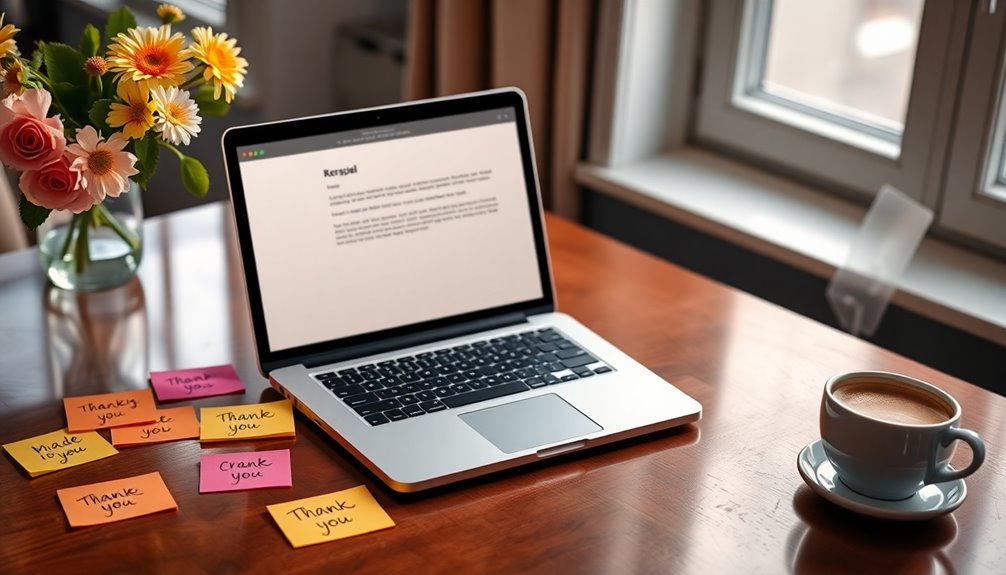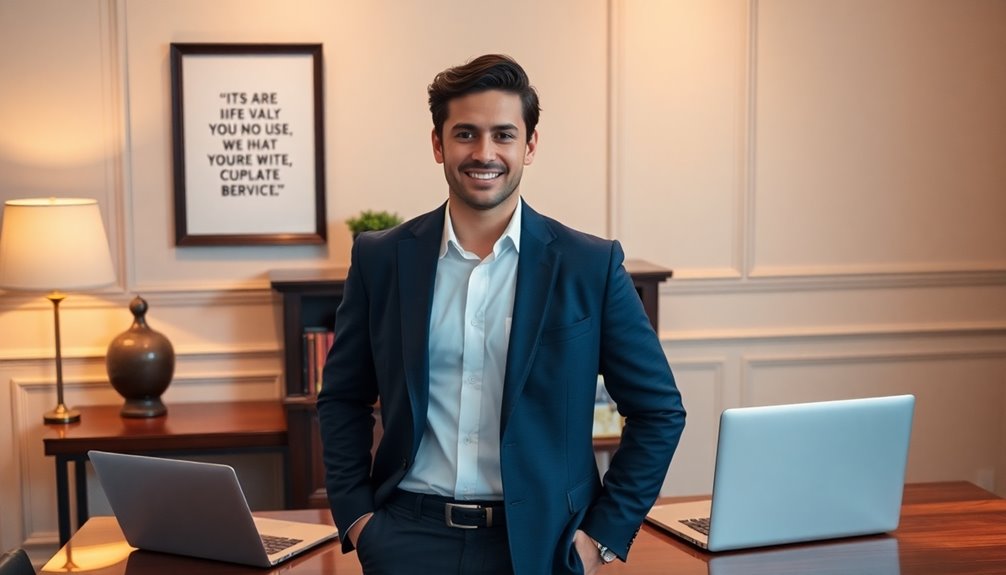To master the art of thank you subject lines, you need to keep them concise and relevant. Use clear phrases like "Thank You for the [Position Title] Interview" to grab attention. Personalize your email by addressing the interviewer by name and mentioning key topics discussed. This shows your engagement and reinforces your connection. Compliments can also enhance your message, reflecting professionalism and genuine gratitude. Remember to send your email within 24 hours for maximum impact. If you're keen to elevate your approach even further, there are more insights waiting for you.
Key Takeaways
- Use a clear and concise subject line, such as "Thank You for the [Position Title] Interview," for professionalism and clarity.
- Personalize the subject line with the interviewer's name or compliment to increase engagement and connection.
- Reference key topics discussed during the interview to demonstrate attentiveness and genuine interest.
- Keep the tone positive and appreciative to reinforce a favorable impression and showcase gratitude.
- Send the email within 24 hours to enhance its effectiveness and show promptness in your follow-up.
Significance of Thank You Emails
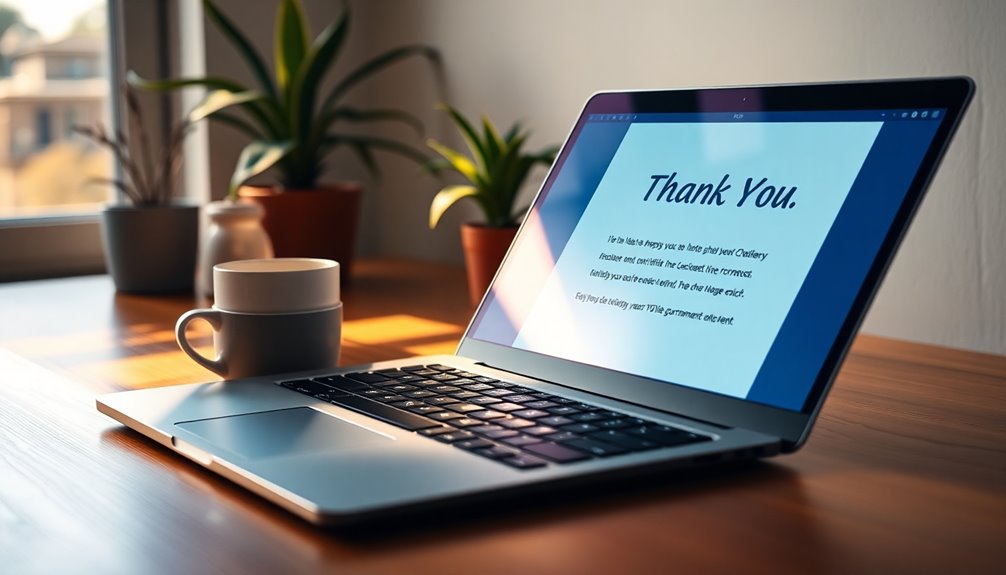
Thank you emails hold significant value in the job application process. They reinforce a positive impression following your interview, showcasing your professionalism and gratitude.
By sending one, you remind the interviewer of your interest in the position and can address any points you may have missed during the conversation. This follow-up demonstrates your commitment and enthusiasm, which can set you apart from other candidates.
Timing is essential; aim to send your email within 24 hours to keep your name fresh in their mind. Avoid weekends or holidays to prevent your message from getting lost in clutter.
Ultimately, a thoughtful thank you email can leave a lasting impression that strengthens your candidacy for the job.
Elements of Effective Subject Lines
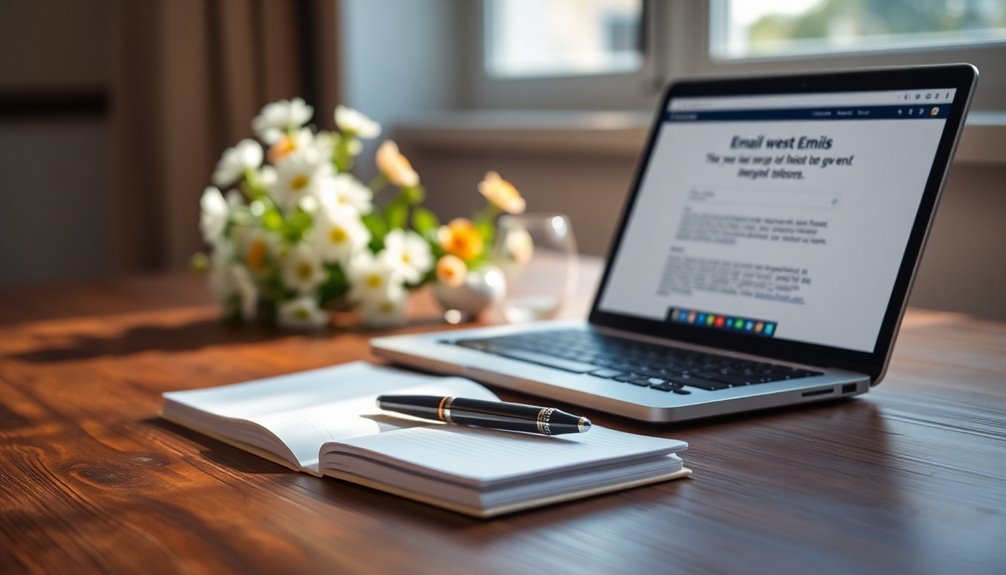
Crafting effective subject lines is key to ensuring your thank you email stands out in a crowded inbox. Start with a concise and relevant phrase, like "Thank You," to immediately convey your email's purpose.
Include the position title for specificity, making it easy for hiring managers to identify your message. Avoid vague phrases; be direct and maintain a professional tone to reflect your seriousness.
Strong examples include "Thank You for the [Position Title] Interview" or "Grateful for the [Position Title] Experience."
Remember, keeping your subject line direct and engaging enhances the likelihood of it being opened, reinforcing your professionalism and enthusiasm for the role.
Clear communication in your subject line sets a positive tone for your email.
Strategies for Personalization
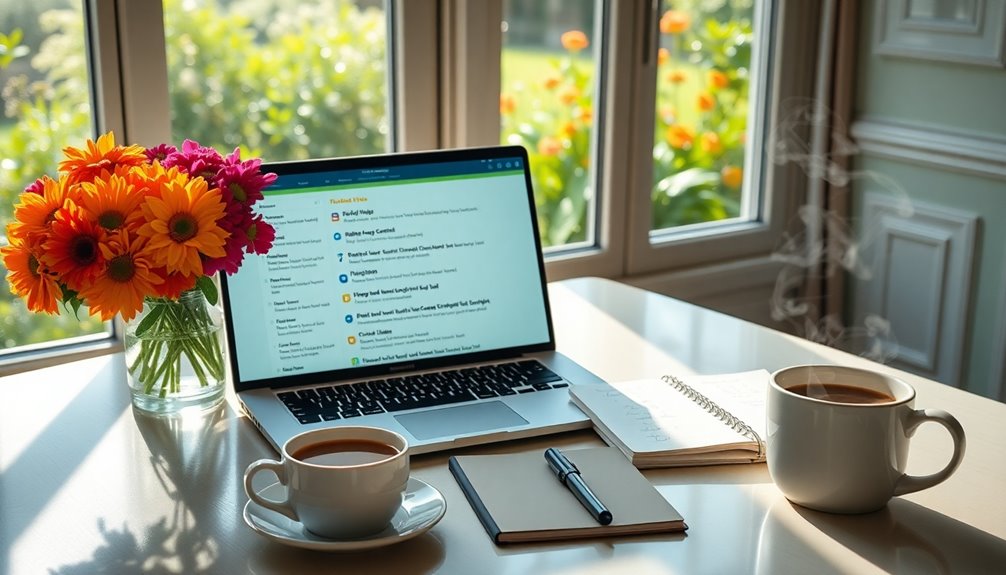
Personalizing your thank you email can substantially enhance its impact and help you stand out. Start by addressing the interviewer by name; this simple touch fosters a connection. Use the name they prefer to show you're attentive. Here's a quick reference table for personalization strategies:
| Strategy | Example | Benefit |
|---|---|---|
| Use Interviewer's Name | "Thanks for meeting with me, Janice!" | Attracts attention |
| Mention a Key Topic | "Appreciated our chat on project management!" | Reinforces engagement |
| Include a Compliment | "I enjoyed your insights on the industry." | Creates a positive impression |
These strategies can strengthen your professional relationships and leave a memorable impression on the interviewer. Additionally, being mindful of communication breakdowns can enhance your follow-up interactions and demonstrate your commitment to effective dialogue.
Highlighting Interview Highlights
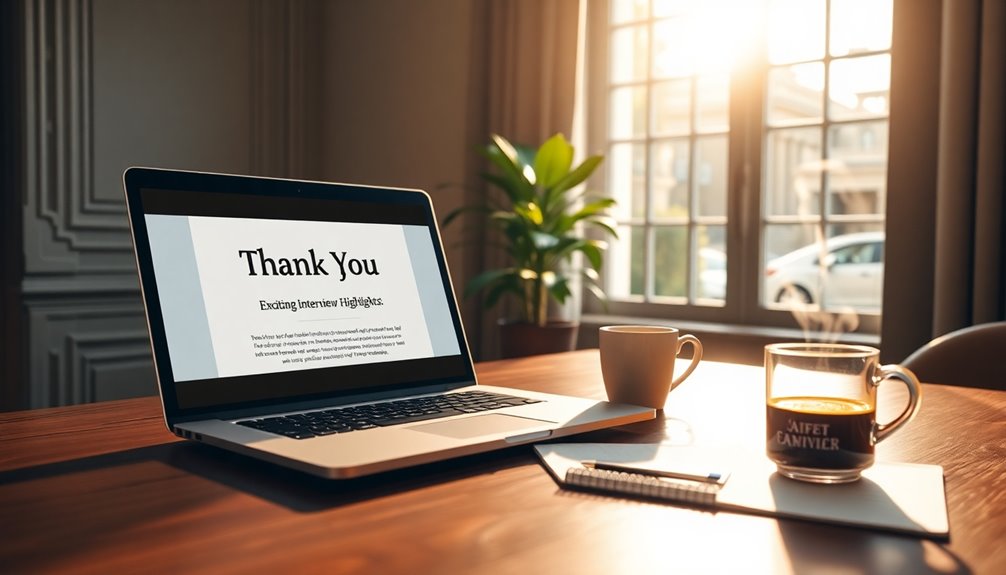
Highlighting key moments from your interview can leave a lasting impression and reinforce your fit for the role. In your thank you email, reference specific topics you discussed, such as a project the team is working on or a challenge they're facing. This shows you were engaged and truly interested in the conversation.
You might say, "I enjoyed discussing the innovative strategies your team is implementing to enhance client engagement." This not only jogs the interviewer's memory but also reiterates your understanding of the position's requirements. Additionally, demonstrating your growth mindset can further illustrate your readiness to adapt and contribute to the team's success.
Using Compliments to Your Advantage

Compliments can serve as a powerful tool in your thank you email, helping to create a positive and memorable impression. By acknowledging the interviewer's expertise or insights, you not only flatter them but also reinforce your connection.
For instance, you might say, "Thank you for sharing your industry knowledge during our conversation." This shows you value their perspective and are engaged.
Additionally, including a compliment in your subject line can grab attention, making your email stand out. Phrases like "I appreciated your insights on team dynamics" can effectively convey gratitude while highlighting your attentiveness.
Ultimately, using compliments wisely can enhance your message, demonstrating both professionalism and genuine appreciation, which may positively influence your candidacy.
Adding Value With Additional Information
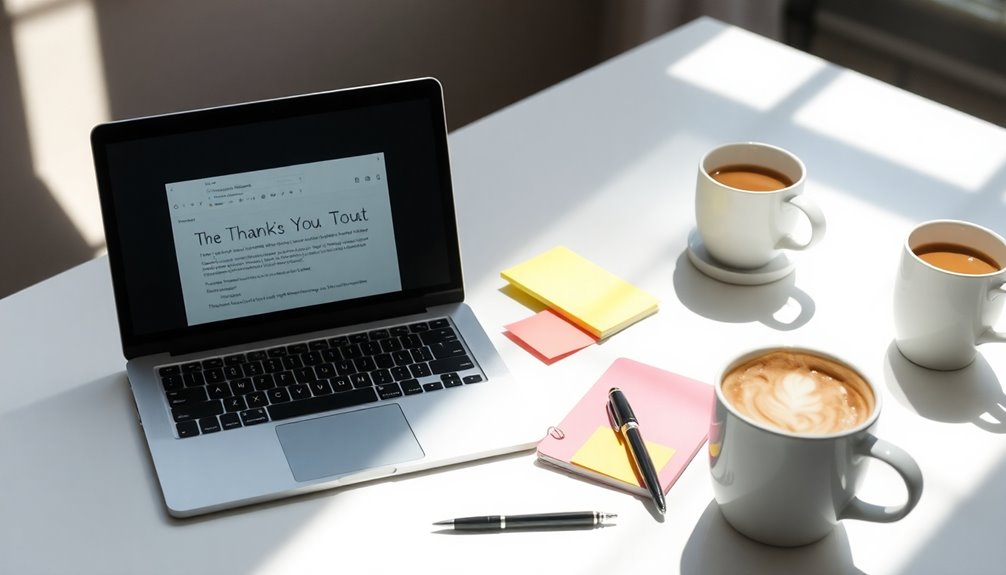
One effective strategy for enhancing your thank you email is to include additional information that showcases your qualifications or reflects on the interview discussion. This not only reinforces your candidacy but also highlights your engagement with the role. Here's a quick reference table for what to include:
| Topic Discussed | Additional Information | Benefit |
|---|---|---|
| Key Project | Relevant experience or skills | Demonstrates fit |
| Company Culture | Personal alignment with values | Shows cultural compatibility |
| Role Responsibilities | Examples of past successes | Highlights contributions |
| Industry Trends | Insights or ideas you can bring | Positions you as proactive |
| Follow-Up Questions | Clarifications or curiosity from the interview | Engages the interviewer |
Including these elements can greatly enhance your thank you email's impact. Additionally, consider reflecting on financial planning as it relates to the role, which can demonstrate your foresight and responsibility in both personal and professional contexts.
Common Misconceptions Addressed
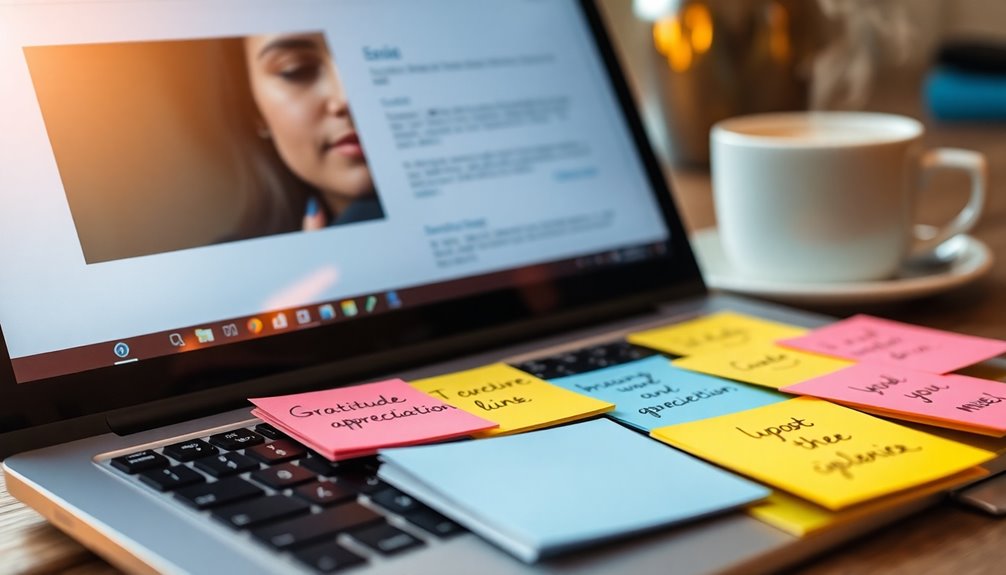
Many people hold misconceptions about thank you emails that can hinder their effectiveness. For instance, some think they're unnecessary if the interview went poorly. In reality, sending a thank you email shows professionalism and gratitude, regardless of the interview outcome.
Others believe a generic subject line suffices, but personalized, specific lines grab attention and reflect your genuine interest. Additionally, many assume these emails should be lengthy; however, brevity is key. A concise message that conveys your appreciation and reiterates your interest is more impactful.
Finally, some worry that sending a thank you email may seem pushy. In truth, it's a thoughtful gesture that strengthens your candidacy and leaves a lasting impression on the interviewer. Moreover, public figures often face scrutiny in their personal narratives, which emphasizes the importance of maintaining a positive reputation in professional communications.
Frequently Asked Questions
Should I Send a Thank You Email After Every Interview?
Yes, you should definitely send a thank you email after every interview. It shows your professionalism and gratitude, reinforcing a positive impression.
By sending it promptly, ideally within 24 hours, you demonstrate your enthusiasm for the position. This follow-up also gives you a chance to reiterate your interest and address any points you may have missed during the conversation.
A thank you email can make you more memorable to hiring managers.
Can I Use a Template for My Thank You Email?
Yes, you can use a template for your thank you email, but make sure to personalize it.
Templates provide a solid structure, helping you save time while ensuring you include essential elements like gratitude and key discussion points.
Just be careful not to sound robotic; tweak it to reflect your voice and the specific interview.
A personalized touch will make your email stand out and show genuine appreciation for the opportunity.
What if I Forgot to Mention Something Important in My Interview?
If you forgot to mention something important in your interview, don't worry! You can address it in your follow-up email.
Briefly explain the point you missed, emphasizing its relevance to the position. This shows your thoroughness and continued interest in the role.
Remember to express gratitude for the opportunity, and keep your message concise. It's a great way to reinforce your candidacy and leave a lasting impression.
Is It Appropriate to Follow up if I Don't Receive a Response?
Yes, it's appropriate to follow up if you don't receive a response.
Wait about a week after sending your thank you email to give them time to review candidates.
In your follow-up, keep it polite and concise, expressing your continued interest in the position.
A gentle nudge can remind them of your application and show your enthusiasm.
Just make sure you strike the right balance between persistence and patience.
How Can I Ensure My Email Doesn't End up in Spam?
Did you know that nearly 45% of emails end up in spam folders?
To guarantee your email doesn't get lost, use a professional email address and avoid spammy keywords like "free" or excessive punctuation.
Keep your subject line clear and concise, and personalize it by including the recipient's name.
Also, consider sending your email within business hours to increase chances of it being seen promptly.
Following these steps can help your message reach its destination.
Conclusion
In summary, mastering your thank you subject lines can feel like wielding a magic wand in the job search domain! With a sprinkle of personalization and a dash of enthusiasm, you'll transform your emails into irresistible invitations for hiring managers to engage further. Remember, the right subject line isn't just a line; it's your golden ticket to standing out in a sea of candidates. So go ahead, craft that perfect subject line, and watch opportunities come rushing your way!
